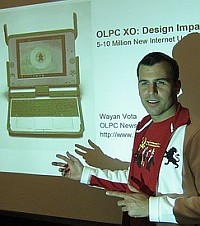How to Blog for Professional Success in International Development
“We need a website. Who wants to figure that out?” says my new boss in the very first staff meeting I attend on the very first day of my new job.
“I will,” I answered, and so in 1995, I started blogging, before there was even a term for it.

Blogging got me on 60 Minutes!
Fast forward 15 years and I’m now paid to blog. In fact, through blogging, I’m known as an ICT4D expert, which has led to the best job I’ve ever had and a sweet consulting gig with the World Bank. It’s also led me to great personal happiness, but that’s a different post.
We’re not here to talk about personal blogs. We’re here at the World Bank’s “Making a Difference in International Development with Blogging” session to learn how to blog your profession to achieve an amazing international development career.
First, do you blog? If you said no, then do you Facebook? Or Twitter? Then you’re blogging. In fact, I would say that in this day and age everyone blogs in one-way or another. Personally, I blog professionally on five platforms:
- ICTworks – an online community for ICT practitioners in the developing world.
- Technology Salon – exploring the nexus of ICT and development
- OLPC News – the premier independent online community on One Laptop Per Child
- Educational Technology Debate – discussing low-cost ICT initiatives for education
- Technology Salon – an in-person, informal discussion at the intersection of ICT and development
That looks like a lot, right? Its actually not, as all these blogs cover the same topic, ICT4D, in different ways, so a post for one can be re-purposed for others. But no matter which blog I write for, I keep 3 things in mind:
Write to Your Key Audience
To improve your professional standing, you need to blog professionally. You need to think of your blogging/social media as a sales tool you’re using to reach your target audience, and then be focused on that audience’s needs.
First, define your target audience. Personify the 5-10 specific people that you’d like to work with or for. Then figure out what might arouse their interest and attention (topics, thoughts, arguments, etc) – ask them directly if you already know them.
Next, slavishly focus on them. Write every blog post as if you are writing to them. You can even send them select blog posts. Just be sure to keep on topics of their interest or find themes they mention elsewhere and comment on them (the ideas) in posts.
If you pick the right key audience (thought leaders in your industry, or decision makers in your field), others will start to read your work too, and soon you’ll be leading a tribe of followers.
The OLPC News Example
When I started OLPC news, my goal was to stop work at the One Laptop Per Child headquarters when I published a post. I wanted to reach the 30+ people leading the initiative and make them think. I wanted to change the way OLPC was being deployed.
By being so purposeful in my writing, I was able to focus on topics that mattered, and I definitely go their attention. I knew that when they sent a consigliere, a Tom Hagen, to tell me to chill out in my rants.
Through that focus, I eventually owned the OLPC community. Over 5,000 people read OLPC News every day, a real achievement for a niche blog, and they spend an average of 4 minutes on the site, an eternity in the web world. And the site is a recognized force in the community, even by Nicholas Negroponte himself, the OLPC founder.
Engage Your Key Audience Everywhere
Realize that no matter your writing skill, you nee dot be where your audience is. A post unread does not exist. So be on any platform your key audience congregates on, from MySpace to Okrut, to LinkedIn, even if you dislike it.
Also, be sure to create opportunities for offline, face-to-face meetings as well. These can be as simple as a meetup over beers, or as formal, scheduled meetings or conferences, but just remember to keep activities focused and relevant to your key audience.
Your goal with both of these activities is to get on your key audience’s and their colleagues’ radar. You want your key audience to think, “Wow, they are everywhere in this space. I need to pay attention to them.”
Once there, you can use the body of work you’d written on the blog as deeper background after you’ve met them, “Thanks for the meeting, by the way, here’s a post I wrote on what we talked about,” and additional contact opportunities, “Do you know this other expert on the topic we talked about?” This will help make you central to their professional community.
Technology Salon Example
Even though I pretty much live online, there isn’t any substitute for meeting in-person. So for each platform, I also organize offline events. In fact, I created the Technology Salon specifically to network with my peers face-to-face.
The Technology Salon started when I wanted to have a few beers with my ICT4D colleagues and talk about our work. Then I realized that like me, they all had spouses, kids, and other entanglements that eliminated casual evening meetups. So I moved the Salons to the morning, gave us a strong industry focus, and served coffee and donuts instead of beers. Only begrudgingly I started blogging our meetings, but they have actually driven greater attendance at Salons.
And wow! The Salons now attract a stunning turnout. We have everyone from Vodafone regional presidents to USAID decision makers, to technology innovators on the cutting edge of ICT, and there is even a three-month waiting list for speaker slots. From this networking session, jobs have been found, proposal teams created, and large contracts won – the ultimate measure of success.
Focus on Tangible Outcomes
Which brings us to the ultimate goal of your professional blogging – cash money, honey. Going back to the first point I made, blogging and social media should be one part of your overall professional sales strategy. And you are selling something: your expertise, monetized as a salary or consulting contract.
So always keep that in mind when you are blogging. You are positioning yourself as a thought leader in your field, raising your profile to “expert”, and advertising your ability to achieve results. This does not happen overnight, of course, but blogging can speed up the process. To copy from Why Blogging is Good for Your Career, here are the seven benefits it bestows:
- Your blog becomes a log of your ideas for yourself (inspiration and record keeping)
- Your blog is like an extended business card (personal branding)
- Looking for materials for posts makes listening and reading more active (focus)
- Researching for posts is educative (learning)
- Posts can be used to claim intellectual property rights (protection)
- Interaction with idols, readers and others (networking)
- A blog makes you visible online (controlling web presence)
From this elevated profile, you should start to get a following, people who read your work regularly. Focus on the quality of your following – is it your key audience? Are they linking to your posts, commenting on them directly or in their own work? And most importantly, are they now coming to you with questions about trends in the industry or best of all, opportunities for employment?
Educational Technology Debate Example
infoDev at the World Bank has always been a leader in the integration of ICT into development, especially ICT4E – the use of ICT in education. They literally wrote the book on its usage around the world and everyone looked to them for leadership.
As I started focusing on ICT4E as part of my overall ICT4D blogging, I consciously focused on attracting their attention. Once I realized that infoDev decision makers were reading my posts, I made sure to meet them in person, integrate their thoughts and ideas in my writing, and generally develop a relationship with them.
Over time, my blogging exploits lead to infoDev inviting me to submit a consultancy proposal for an ICT4E community of practice. And now I just finished a two-year contract organizing the Educational Technology Debate, which itself has lead to other consulting offers.
Blogging is Not Silver Bullet
Note that blogging should only be one sales tool of several you should use to promote yourself. Business cards, a good resume, clear focus on the skills you bring and the position you want, are just as important.
And all of this is predicated on your ability to think critically and express yourself fluently – though both of these will improve as you blog more. Practice makes perfect, and blogging has you practice your writing regularly.
So what are you waiting for? Start blogging on your profession today and dream about the kick-ass ICT job you’ll have tomorrow.



